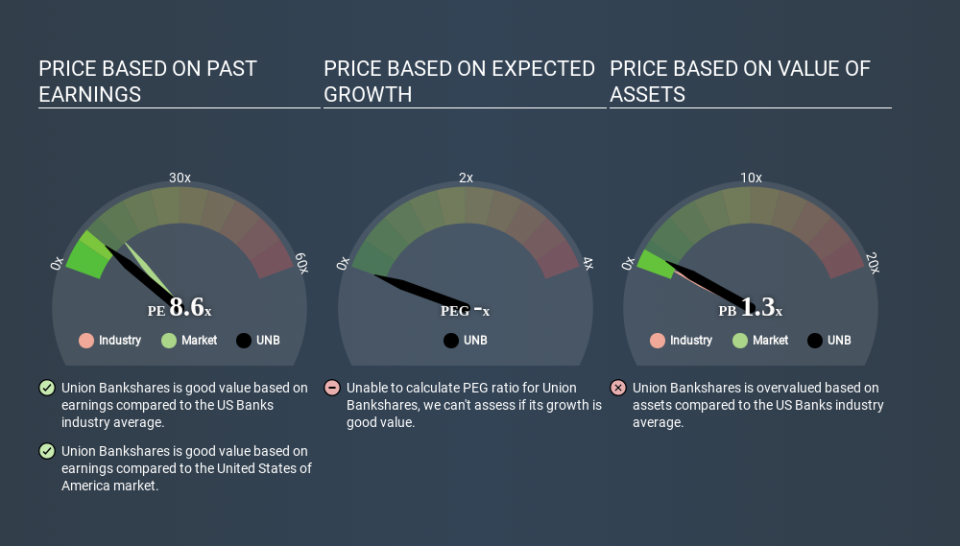A Sliding Share Price Has Us Looking At Union Bankshares, Inc.'s (NASDAQ:UNB) P/E Ratio

To the annoyance of some shareholders, Union Bankshares (NASDAQ:UNB) shares are down a considerable 31% in the last month. Indeed the recent decline has arguably caused some bitterness for shareholders who have held through the 55% drop over twelve months.
Assuming nothing else has changed, a lower share price makes a stock more attractive to potential buyers. In the long term, share prices tend to follow earnings per share, but in the short term prices bounce around in response to short term factors (which are not always obvious). The implication here is that long term investors have an opportunity when expectations of a company are too low. One way to gauge market expectations of a stock is to look at its Price to Earnings Ratio (PE Ratio). A high P/E implies that investors have high expectations of what a company can achieve compared to a company with a low P/E ratio.
See our latest analysis for Union Bankshares
Does Union Bankshares Have A Relatively High Or Low P/E For Its Industry?
Union Bankshares has a P/E ratio of 8.62. As you can see below Union Bankshares has a P/E ratio that is fairly close for the average for the banks industry, which is 8.8.
That indicates that the market expects Union Bankshares will perform roughly in line with other companies in its industry. The company could surprise by performing better than average, in the future. I would further inform my view by checking insider buying and selling., among other things.
How Growth Rates Impact P/E Ratios
Generally speaking the rate of earnings growth has a profound impact on a company's P/E multiple. That's because companies that grow earnings per share quickly will rapidly increase the 'E' in the equation. And in that case, the P/E ratio itself will drop rather quickly. And as that P/E ratio drops, the company will look cheap, unless its share price increases.
Union Bankshares's earnings made like a rocket, taking off 50% last year. Having said that, if we look back three years, EPS growth has averaged a comparatively less impressive 7.7%.
Remember: P/E Ratios Don't Consider The Balance Sheet
It's important to note that the P/E ratio considers the market capitalization, not the enterprise value. Thus, the metric does not reflect cash or debt held by the company. Theoretically, a business can improve its earnings (and produce a lower P/E in the future) by investing in growth. That means taking on debt (or spending its cash).
Such spending might be good or bad, overall, but the key point here is that you need to look at debt to understand the P/E ratio in context.
How Does Union Bankshares's Debt Impact Its P/E Ratio?
Union Bankshares has net cash of US$8.7m. That should lead to a higher P/E than if it did have debt, because its strong balance sheets gives it more options.
The Verdict On Union Bankshares's P/E Ratio
Union Bankshares has a P/E of 8.6. That's below the average in the US market, which is 13.0. Not only should the net cash position reduce risk, but the recent growth has been impressive. The relatively low P/E ratio implies the market is pessimistic. What can be absolutely certain is that the market has become more pessimistic about Union Bankshares over the last month, with the P/E ratio falling from 12.6 back then to 8.6 today. For those who prefer to invest with the flow of momentum, that might be a bad sign, but for deep value investors this stock might justify some research.
Investors have an opportunity when market expectations about a stock are wrong. If the reality for a company is not as bad as the P/E ratio indicates, then the share price should increase as the market realizes this. Although we don't have analyst forecasts you might want to assess this data-rich visualization of earnings, revenue and cash flow.
Of course you might be able to find a better stock than Union Bankshares. So you may wish to see this free collection of other companies that have grown earnings strongly.
If you spot an error that warrants correction, please contact the editor at editorial-team@simplywallst.com. This article by Simply Wall St is general in nature. It does not constitute a recommendation to buy or sell any stock, and does not take account of your objectives, or your financial situation. Simply Wall St has no position in the stocks mentioned.
We aim to bring you long-term focused research analysis driven by fundamental data. Note that our analysis may not factor in the latest price-sensitive company announcements or qualitative material. Thank you for reading.

 Yahoo News
Yahoo News 

